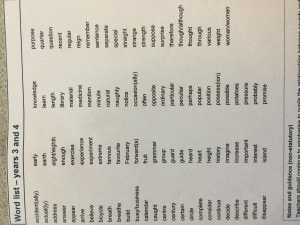Summer Half Term
In line with our Homework Policy, there are no homework tasks or spellings to learn next week because it’s the Summer half-term holiday. Of course, there are plenty of ways to help your child continue learning: get reading, go places, talk lots!
Have a happy and healthy holiday.
20 May 2016
The week’s spellings all link in with money week.
- penny
- pound
- amount
- pence
- currency
- Euro
- change
- budget
- charity
Your child has nine spellings to learn and must find their own money word that they will also be tested on.
13 May 2016
This week’s spellings are all common exception words. These are words that Year 3 children are expected to know. Lower down school they are often called tricky words because they don’t always follow expected phonetic rules. For example the ‘ar’ in forward makes an ‘uh’ sound.
- forward
- fruit
- grammar
- group
- guide
- heard
- heart
- height
- history
We’ve learnt some of these words before but they are still cropping up as errors in class.
06 May 2016
This week’s spellings are all homophones. Homophones are two or more words that sound the same but are spelt differently and mean different things. For example: fair (a place with rides and games) and fare (the cost of public transport).
- grown / groan
- eight / ate
- woman / women
- heard / herd
Your child also needs to find their own pair (not pear!) of homophones which they will be tested on.
29 April 2016
This week’s spellings all have the ‘-ou’ digraph. These spellings all have ‘-ou’ making an ‘uh’ sound (as in touch and country) or ‘-ough’ making an ‘uff’ sound (as in enough).
young
touch
double
trouble
country
tough
rough
enough
cough
fought
These spellings will be tested next Friday. Why not go on spellodrome to practise your spellings?
22 March 2016
This week’s spellings end in ‘-sure’ and ‘-ture’.
measure
treasure
pleasure
enclosure
creature
furniture
picture
nature
adventure
Your child has nine spellings to learn and must find their own tenth spelling that ends in either ‘-sure’ or ‘-ture’. They will be tested on seven of these spellings and their own word next Friday.
25 March 2016
This week, your child has a word study to complete. They must find an A – Z list of words that follow the ‘double up for a short vowel sound’ spelling rule. For example, ‘apple’ and ‘attractive’ have a doubled-up letter to make the ‘a’ in front a short sound (compare the ‘a’ sound in ‘apple’ and ‘able’).
The words your child finds must be words that they feel they could use in their writing in class. I would encourage the use of a dictionary or even the use of an internet search engine. If your child is searching for words online, make sure you speak to them about being e-safe.
18 March 2016
This week, your child has been given a copy of the Year 3/4 spelling list. They must pick 10 spellings that follow the rule double up for a short vowel sound. Words that follow this rule include comma (compare the sound of the ‘o’ with coma, where there is no double up), hopping (compared with hoping) and funny. Why not ask your child to identify the short vowel sound in each of these words. 
11 March 2016
This week’s spellings all contain negative prefixes. Negative prefixes change the meaning of the root word to the opposite. Your child will need to be able to spell all the root words below and know which negative prefix can be applied (for example, misappear will count as an incorrect answer in Friday’s test). Your child only has the root words in their learning list but if they get stuck identifying which negative prefix to apply, they are as follows:
disappear
inconsistent
unfair
unhappily
unusually
infamous
misunderstand
disadvantage
mismatch
unjust
04 March 2016
 This week’s selling all have a negative prefix. This makes the new word mean the opposite of the root word (so untidy means messy, the opposite of tidy).
This week’s selling all have a negative prefix. This makes the new word mean the opposite of the root word (so untidy means messy, the opposite of tidy).
As well as the eight below, your child needs to find two more words with a negative prefix which they will be tested on on Friday.
- disappoint
- disagree
- disobey
- misbehave
- mislead
- misspell
- inactive
- incorrect